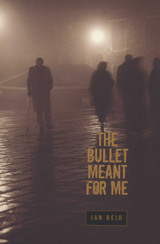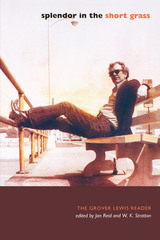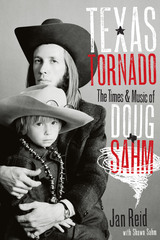

Winner, Coral Horton Tullis Memorial Prize, Texas State Historical Association, 2012
Liz Carpenter Award for Research in the History of Women, Texas State Historical Association, 2012
When Ann Richards delivered the keynote of the 1988 Democratic National Convention and mocked President George H. W. Bush—“Poor George, he can’t help it. He was born with a silver foot in his mouth”—she instantly became a media celebrity and triggered a rivalry that would alter the course of American history. In 1990, Richards won the governorship of Texas, upsetting the GOP’s colorful rancher and oilman Clayton Williams. The first ardent feminist elected to high office in America, she opened up public service to women, blacks, Hispanics, Asian Americans, gays, and the disabled. Her progressive achievements and the force of her personality created a lasting legacy that far transcends her rise and fall as governor of Texas.
In Let the People In, Jan Reid draws on his long friendship with Richards, interviews with her family and many of her closest associates, her unpublished correspondence with longtime companion Bud Shrake, and extensive research to tell a very personal, human story of Ann Richards’s remarkable rise to power as a liberal Democrat in a conservative Republican state. Reid traces the whole arc of Richards’s life, beginning with her youth in Waco, her marriage to attorney David Richards, her frustration and boredom with being a young housewife and mother in Dallas, and her shocking encounters with Lyndon Johnson and Jimmy Carter. He follows Richards to Austin and the wild 1970s scene and describes her painful but successful struggle against alcoholism. He tells the full, inside story of Richards’s rise from county office and the state treasurer’s office to the governorship, where she championed gun control, prison reform, environmental protection, and school finance reform, and he explains why she lost her reelection bid to George W. Bush, which evened his family’s score and launched him toward the presidency. Reid describes Richards’s final years as a world traveler, lobbyist, public speaker, and mentor and inspiration to office holders, including Hillary Clinton. His nuanced portrait reveals a complex woman who battled her own frailties and a good-old-boy establishment to claim a place on the national political stage and prove “what can happen in government if we simply open the doors and let the people in.”

Honorable Mention, Carr P. Collins Award for Best Book of Nonfiction, 2006
Grover Lewis was one of the defining voices of the New Journalism of the 1960s and 1970s. His wry, acutely observed, fluently written essays for Rolling Stone and the Village Voice set a standard for other writers of the time, including Hunter S. Thompson, Joe Eszterhas, Timothy Ferris, Chet Flippo, and Tim Cahill, who said of Lewis, "He was the best of us." Pioneering the "on location" reportage that has become a fixture of features about moviemaking and live music, Lewis cut through the celebrity hype and captured the real spirit of the counterculture, including its artificiality and surprising banality. Even today, his articles on Woody Guthrie, the Allman Brothers, the Rolling Stones concert at Altamont, directors Sam Peckinpah and John Huston, and the filming of The Last Picture Show and One Flew over the Cuckoo's Nest remain some of the finest writing ever done on popular culture.
To introduce Grover Lewis to a new generation of readers and collect his best work under one cover, this anthology contains articles he wrote for Rolling Stone, Village Voice, Playboy, Texas Monthly, and New West, as well as excerpts from his unfinished novel The Code of the West and his incomplete memoir Goodbye If You Call That Gone and poems from the volume I'll Be There in the Morning If I Live. Jan Reid and W. K. Stratton have selected and arranged the material around themes that preoccupied Lewis throughout his life—movies, music, and loss. The editors' biographical introduction, the foreword by Dave Hickey, and a remembrance by Robert Draper discuss how Lewis's early struggles to escape his working-class, anti-intellectual Texas roots for the world of ideas in books and movies made him a natural proponent of the counterculture that he chronicled so brilliantly. They also pay tribute to Lewis's groundbreaking talent as a stylist, whose unique voice deserves to be more widely known by today's readers.

Doug Sahm was a singer, songwriter, and guitarist of legendary range and reputation. The first American musician to capitalize on the 1960s British invasion, Sahm vaulted to international fame leading a faux-British band called the Sir Douglas Quintet, whose hits included "She's About a Mover," "The Rains Came," and "Mendocino." He made the cover of Rolling Stone magazine in 1968 and 1971 and performed with the Grateful Dead, Dr. John, Willie Nelson, Boz Scaggs, and Bob Dylan.
Texas Tornado is the first biography of this national music legend. Jan Reid traces the whole arc of Sahm's incredibly versatile musical career, as well as the manic energy that drove his sometimes turbulent personal life and loves. Reid follows Sahm from his youth in San Antonio as a prodigy steel guitar player through his breakout success with the Sir Douglas Quintet and his move to California, where, with an inventive take on blues, rock, country, and jazz, he became a star in San Francisco and invented the "cosmic cowboy" vogue. Reid also chronicles Sahm's later return to Texas and to chart success with the Grammy Award–winning Texas Tornados, a rowdy "conjunto rock and roll band" that he modeled on the Beatles and which included Sir Douglas alum Augie Meyers and Tejano icons Freddy Fender and Flaco Jimenez.
With his exceptional talent and a career that bridged five decades, Doug Sahm was a rock and roll innovator whose influence can only be matched among his fellow Texas musicians by Buddy Holly, Roy Orbison, Janis Joplin, and Stevie Ray Vaughan. Texas Tornado vividly captures the energy and intensity of this musician whose life burned out too soon, but whose music continues to rock.
READERS
Browse our collection.
PUBLISHERS
See BiblioVault's publisher services.
STUDENT SERVICES
Files for college accessibility offices.
UChicago Accessibility Resources
home | accessibility | search | about | contact us
BiblioVault ® 2001 - 2024
The University of Chicago Press









